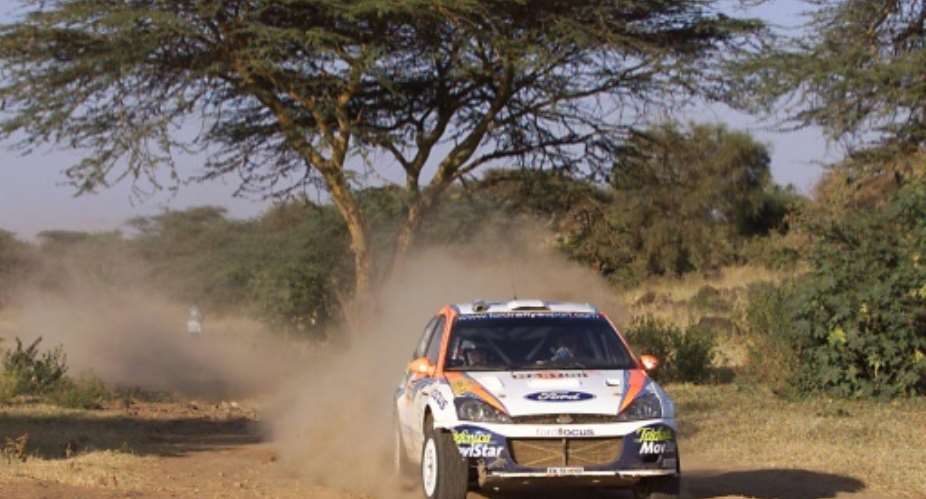The World Rally Championship has changed since it last went on safari in East Africa in 2002, but while the course will be tamer for its return to Kenya, the race still represents a ride into the unknown for the teams and drivers.
In 2002, when the World Rally Championship last visited Kenya, the race had 12 stages, none shorter than 73km, covering a total of 1,010km.
This time the format is closer to modern European rallies with 18 special stages totalling 320.19km.
In 2002, drivers dodged wild life and the spectators crowding by the road.
The pot-holed terrain was a car killer, with only nine of 20 starters completing the race, which was won by Scot Colin McRae in a Ford.
Finn Harri Rovanpera was second in a Peugeot and his son Kalle, who is sixth in this year's driver standings driving a Toyota Yaris, has heard all about that race.
"I've seen all the old videos from then and he has been telling a lot of stories," the younger Rovanpera told his team web site, adding: "Rallying as a sport is quite different now."
Yet the landscape presents unfamiliar dangers.
"It's a challenge, that's for sure," said Toyota team-mate and championship leader Sebastian Ogier on Wednesday in a video press conference after finishing fastest earlier in the day in the pre-race 'shakedown'.
"The biggest challenge for me will be to find the right rhythm, to go fast in some places and to survive in the trickier sections."
"I feel ready, but can you really be ready for a rally like this, I don't know," he said.
"It's very dry, so we won't see pictures of cars going through huge mud puddles, like in the old days," Ogier, adding that he expected 'fesh-fesh', or fine sand.
"We'll have a lot of fesh-fesh sections, because it hasn't rained for a long time, and we'll get a lot of sand and dust in the cars."
"We are going to have to set our targets a little differently: The way we drive nowadays in the WRC is by really pushing the limits all of the time, but it will be much more about trying to survive the rally without trouble," said Ogier.
Toyota has won four of the last five rallies and Ogier leads team-mate Elfyn Evans by 11 points.
'Avoid big holes'
"I suspect it's not going to be the smoothest event on the calendar, and it could be a big test for the car and maybe for the crew as well," Welshman Evans said.
Hyundai's Thierry Neuville is their closest challenger, 29 points off Ogier.
Both Toyota and Hyundai have been in Spain, testing new suspensions capable of withstanding more extreme conditions.
"We'll have to avoid the big holes, not damage the car, even if it means slowing down a lot in certain places," said Neuville. "It will be the biggest challenge in the modern WRC, there will be a lot of things happening..."
"I don't know what is waiting for us, but I hope to come back with a big trophy," said the Belgian. "We'll be seeing zebras, elephants and giraffes. It is going to be fun!"
The race starts on Thursday afternoon with a 5km city stage in Nairobi before moving out to the bush.





 Former Kotoko Player George Asare elected SRC President at PUG Law Faculty
Former Kotoko Player George Asare elected SRC President at PUG Law Faculty
 2024 elections: Consider ‘dumsor’ when casting your votes; NPP deserves less — P...
2024 elections: Consider ‘dumsor’ when casting your votes; NPP deserves less — P...
 You have no grounds to call Mahama incompetent; you’ve failed — Prof. Marfo blas...
You have no grounds to call Mahama incompetent; you’ve failed — Prof. Marfo blas...
 2024 elections: NPP creates better policies for people like us; we’ll vote for B...
2024 elections: NPP creates better policies for people like us; we’ll vote for B...
 Don’t exchange your life for wealth; a sparkle of fire can be your end — Gender ...
Don’t exchange your life for wealth; a sparkle of fire can be your end — Gender ...
 Ghana’s newly installed Poland train reportedly involved in accident while on a ...
Ghana’s newly installed Poland train reportedly involved in accident while on a ...
 Chieftaincy disputes: Government imposes 4pm to 7am curfew on Sampa township
Chieftaincy disputes: Government imposes 4pm to 7am curfew on Sampa township
 Franklin Cudjoe fumes at unaccountable wasteful executive living large at the ex...
Franklin Cudjoe fumes at unaccountable wasteful executive living large at the ex...
 I'll 'stoop too low' for votes; I'm never moved by your propaganda — Oquaye Jnr ...
I'll 'stoop too low' for votes; I'm never moved by your propaganda — Oquaye Jnr ...
 Kumasi Thermal Plant commissioning: I pray God opens the eyes of leaders who don...
Kumasi Thermal Plant commissioning: I pray God opens the eyes of leaders who don...
